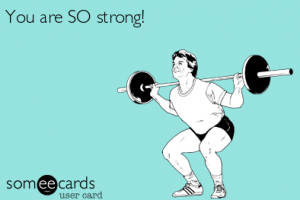
photo credit Sarah Treanor
www.streanor.com
6th August 2018
I fancy a series of blogposts on platitudes and statements that really are not compliments, not helpful to a grieving person. Or at least to me. There are so many phrases that I hear that make me want to snarl. And sometimes I bite. Whether or not I write a series of blogs or just this one remains to be seen.
With the incredible insight and wisdom of Grieflings in the Writing Your Grief/Refuge in Grief community, I have realised why one of the phrases I most often hear feels so insulting when clearly it is meant as praise. That phrase?
“You’re so strong! I couldn’t do what you are doing!”
And other versions of it:
“You’re the strongest person I know!”
“If anyone can do this, it’s you!”
“You’re so strong! I would have given up by now!”
“With everything that’s happened, with everything you have going on, how do you do it? I just know I couldn’t!”
They all sound alright on the surface, don’t they? Some of you will have even said these to me. Heck – I am sure I have said them to others who lost loved ones before I lost mine. It’s meant to be encouraging. 
So how come almost every person in my grieving community feels triggered, undermined, or even criticised by these words? For sure, there are some in the grieving community who are noble enough to look past the words and at the intention behind them, which is more than I can do a lot of the time. They can stand back, hear the words, and say to themselves, “They really are trying to be helpful, to support me. Good enough”.
But for many of us – including myself at times – the words irritate and grate; they cause anger to rise from wherever it’s hiding that day, and come out at a minimum in clenched teeth and a jutting jaw, or a tirade like, “So, you think I have a choice? You think there are options here? You think being weak is an alternative?”
Here’s why these words grate – and this wisdom comes from a number of people in my writing community, particularly a woman, Debra Coddington, whose son Baylin died a tragic and accidental death at the age of 26, the night before his wedding. It’s best if I just let her words speak for themselves. I cannot express it better. (And I have Debra’s permission to use her language and deep insight, as well as any other statements made by others, whether specifically attributed or not).
“Simplistic statements about being “strong” trivialize and dismiss the prismatic effects of grief. They annoy the shit out of me because they enable those who are uninitiated (to loss) to dismiss its reality… …Strength does not mitigate one scintilla of the pain of loss, nor does it collide with it. Strength and profound pain can (and often do) co-exist and run parallel. It takes enormous courage to keep breathing after life-shattering loss. It takes great courage to wake up and walk into a world where the person we love most deeply no longer shares our life. Grieflings may be the most courageous individuals on the planet, for they quietly and choicelessly do this every moment of every day of their lives.
“Simplistic statements about strength, about pain and loss, are not for the grieving. They are instead for the uninitiated, to enable them to feel better about ignoring the (uglier) aspects of grief…The uninitiated have simply been more fortunate than those of us who grieve. Overly-simplistic ideas (often served up as platitudes) seem a mechanism to allow guiltless acknowledgment; a nodding at pain rather than empathizing; rather than connecting to it or to those in its throes….(We consist of) myriad complex emotions based on love and (now) loss”.
Others added and commented on Debra’s thoughts, and some dialogue ensued:
Elizabeth Hargrave said, “I am angry at people saying you are the strongest person I know. I want to scream! I have always been this strong. Actually, I was stronger before because with James I could do anything”.
“Thank you for unpacking this platitude. I have not truly understood until now why this (phrase) pisses me off so much. The implication in the praise is that ‘you’ve got this’….’you’re so strong you don’t need my help, love, empathy, companionship in the depths of your despair'”.
“The imperative comment I receive all too often just bugs the hell out of me! “Be strong.” I just want to reply, “What the f*ck does that even mean!?!””
“I think it means, “Make this nicer for me please. For fuck’s sake, make this easier for those of us who don’t want to get in the emotional dirt with you and all your pain.” Be strong, means, “I can’t, I won’t expend the effort on empathy. It’s too hard. It hurts too much.” It means, “Give me simple answers to what are endless, complex and universal feelings.” It means, “I haven’t been brought to my knees by loss and I don’t understand yours and I’m really not sure I want to!” … That’s what I think “Be strong,” means. Not only is it not helpful… It seeks to shut us down when we’ve been cracked wide open”.
Wise Angry Soulful Heartfelt views from the club none of us wants to be part of, but sadly are.

So – what to do instead of saying to me (or anyone who’s lost a treasured love), “You’re so strong!/Be strong!/I admire your courage!”?
What would work (I think) with me is, “This must be so very very hard, all of the time. It must really hurt. Doing all of this without your sweet Mike. I wish I knew what to say, or how to help, but the truth is, I have no idea. And I am here, with you, as best as I can be in this, in what is yours to carry. Alongside you. For as long as it takes. Which might be forever”.
I might just take a few deep breaths, look at you in shock, hug you tightly, sob, and never let go. And that’s okay. That’s still courage and strength. And you would have shown enormous strength and courage too.
And most of all, compassion.
photo credit Sarah Treanor
www.streanor.com

